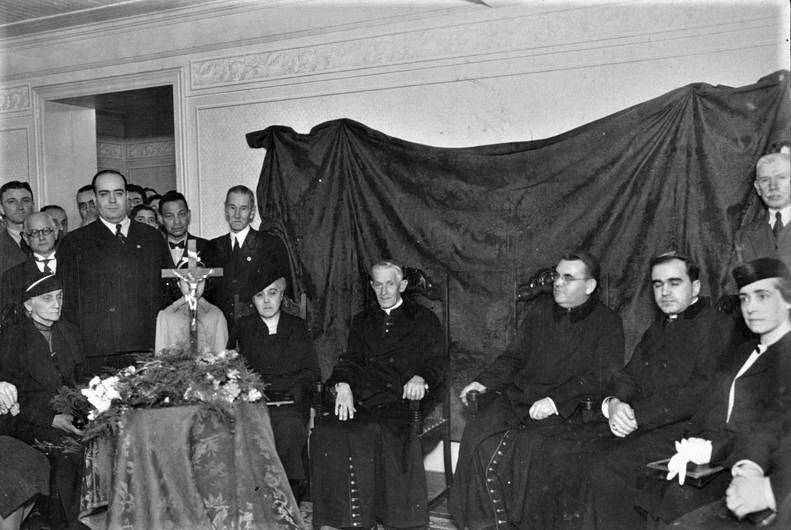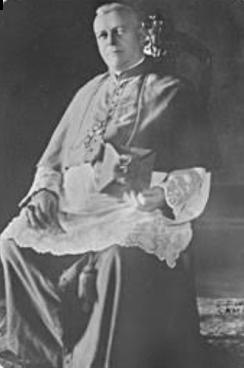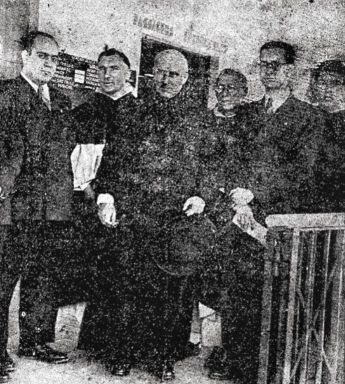|
Chapter III
5. The apogee of the Legionário
|
|
|
On 3 May 1938 the new printing works of the Legionário were blessed in the presence of Archbishop Duarte Leopoldo e Silva,49 and of the ecclesiastic, intellectual and social elite of São Paulo. Numerous were the subscribers and admirers of the magazine who, not being able to participate, sent messages of their esteem and encouragement from every part of Brazil.
Among these it is worth quoting the full text of the letter of Octaviano Pereira de Albuquerque, Archbishop-bishop of Campos, one of the most illustrious personages of the Brazilian clergy. It offers an eloquent testimony of the esteem and admiration which surrounded the Legionário in this period. The letter, dated 18 April 1938, is addressed personally to Plinio Corrêa de Oliveira: “Constantly favoured by you with a copy of your weekly — Legionário — that you kindly send me and the reading of which I prefer to other papers, I feel impelled to sincerely congratulate you for all the good you do to society. You show, in light of the excellent use of your intellectual activity, to have received an exemplary religious education from a tender age. You have known how to allow yourself to be guided by proven directors who helped you to become director of a Catholic paper filled with useful and substantial matter on every subject related to Religion and to the social issues of the day without bothering with banal and trivial things. Furthermore, I have noticed the gravity with which political issues are dealt: they do not alter your ideals, and you show no acrimony towards the enemy; they avoid useless and, even, counterproductive arguments which create personal animosities. Wishing you a happy Easter, I ask God to continue to personally bless you, may He always give you courage to, ‘sans peur et sans reproche’, fight for the holy cause of our august religion. From your devoted friend and admirer”.50 Another important and significant visit dates to this same year. In the summer of 1938, the famous Dominican priest, Father Réginald Garrigou-Lagrange,51 arrived in Brazil to participate in the first week of Thomist studies held in Rio, under the chairmanship of the Nuncio Aloisi Masella. Father Garrigou-Lagrange then went to São Paulo, where he visited the Legionário staff.52 In the issue dated 18 September 1938, a photograph shows Plinio Corrêa de Oliveira next to the French Dominican.
The latter replied as follows to a request from the Legionário to comment on the phrase “The Church is neither on the right nor on the left”: “I am a man of the right and I do not see why I should hide the fact. I believe that many of those who use the phrase quoted use it for abandoning the right and then sliding towards the left. While trying to avoid an excess, they fall into the opposite, as happened in France in recent years. I also believe that we should not confuse the true right with false rights, which defend a false order, not the true one. But the true right, that defends order founded on justice, seems to be a reflection of what the Scriptures call “the right-hand of God” when they proclaim that Christ is seated at the right-hand of the Father and the elect will be at the right-hand of the Most High”.53 Notes: 49) “It is with the heart of a Bishop and with all my soul — the archbishop stated — that I come to bless you today, not only for the inauguration of the machines of our Journal, but, moreover, for your dedication and your spirit of Faith” (Cf. “O Legionário”, no. 295, 8 May 1938). 50) Cit. O Legionário, no. 296, 15 May 1938. A similarly significant special apostolic blessing of Pius XII to the Legionário, was transmitted the following year to Dr Plinio by Cardinal Leme who was in Rome for the coronation of the new Pontiff. This is the text of the letter, dated 5 April 1939: “My dear Dr Plinio. From my heart I thank you for the kind telegram you sent me from Bahia. With pleasure I give the special blessing that the Holy Father granted to our intrepid Legionário and its well-deserving director, a true man of the Catholic press, of editors, benefactors and readers”, O Legionário, no. 346, 30 April 1939. 51) Father Reginald Garrigou-Lagrange was born in Auch, near Tarbes, in 1877 and died in Rome in 1964. A pupil of the Dominicans Cormier, Gardeil and Arintero, he was one of the greatest theologians of the twentieth century. Cf. the large bibliography in Angelicum, no. 42, 1965, pp. 200-72. Cf. also Innocenzo Colosio O.P., “Il P. Maestro Reginald GarrigouLagrange. Ricordi personali di un discepolo”, Rivista di Ascetica e Mistica, no. 9, 1964, pp. 226-40; Benoît Lavaud, Garrigou-Lagrange, in DSp, vol. VI (1967), coll. 128-34. 52) Cf. O Legionário, no. 309, 14 August 1938 and no. 310, 21 August 1938. 53) Cit. O Legionário, no. 313, 11 September 1938. |
|




